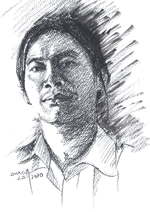As the plane descended into Rangoon's international airport, I noticed a slight change in my heartbeat. I felt calm, but also excited, knowing that I was about to return to Burma for the first time in 24 years.
Inside the airport, a young immigration officer smiled as I gave him my passport. He was quite chatty, asking me about The Irrawaddy—how we gather news from inside Burma, how we designed our website. With a smile that betrayed his betel-chewing habit—his teeth had a telltale tinge of red—he said he visited our site as often as possible. Meanwhile, the people waiting in line behind me grew impatient as they were made to wait until my friendly interrogation was finally over.
 |
Aung Zaw is founder and editor of the Irrawaddy magazine. He can be reached at [email protected].
|
A TV crew from
Al Jazeera that came to film my arrival was soon joined by officers from the Special Branch who also wielded cameras. They politely snapped a few photos, and I smiled back at them. I also jokingly told them to make sure they reported the correct information about me to their superiors. They assured me they would, asked me my age, and then left me alone.
Finished at the airport, I made my way to my hotel downtown. Looking around at the city where I had spent the first 20 years of my life, I was struck by how much it had changed since 1988. Thoughts of my final days there also crowded my mind. At that time, Rangoon was in a state of upheaval, with soldiers everywhere, gunfire crackling all around and blood staining the streets. Fear and anarchy gripped the former capital.
But even during my years in exile, I never truly left Burma. Day and night, it was always in my mind. I closely followed events in my country from neighboring Thailand. I wrote about developments there on a regular basis, first for Thai newspapers and then for The Irrawaddy, which I founded in 1993. I also made frequent visits to the Thai-Burmese border, where I occasionally slipped into rebel-controlled territory to get a very different perspective on the country of my birth.
In my dreams, I returned countless times to my home and family in Rangoon. But these dreams always ended as nightmares, as I found myself surrounded by secret police and local informers.
My grandmother, who is now in her 80s and living with me in Thailand, was genuinely worried when I told her that I had received a visa to return to Burma. Like most Burmese, she has a deep mistrust of the authorities. She advised me to chant Buddhist sutras to ward off any misfortune that might befall me.
By the time I arrived at the hotel, the slight tension I had felt earlier had dissolved. The spirit of Burma embraced me, and I began to ease into the feeling that I was back home.
But even at this moment, some things seemed strange. The sound of hotel staff greeting guests with a cheerful “Mingalaba,” for instance, was slightly jarring to my ears. In my childhood, it was a word we used only when speaking to our teachers; now, however, you hear it every time you enter a restaurant or hotel.
After a lunch meeting with a group of editors and publishers in downtown Rangoon, I rushed to meet Tint Swe, the deputy director general at the Ministry of Information. The reception was warm. Without beating around the bush, we quickly jumped into a discussion about the changing media landscape, the draft media law and many other issues surrounding media development in Burma.
It was a bit of a surreal experience, since we usually derided the press censorship board in our publication. And yet, there I was, sitting and speaking with a senior censorship official in his office—in a building known to most Burmese writers as the headquarters of the “literary Kempeitai,” because it had been used during WWII by the Kempeitai, Japan's notorious wartime military police force.
After that meeting, I went to a market near Shwedagon Pagoda, where several people grabbed me and asked me to sit down for a chat. They spoke to me as they would to a long lost friend. Some recognized me from “Dateline Irrawaddy,” our weekly TV program broadcast via the Oslo-based Democratic Voice of Burma. They said they read our website, which became accessible in Burma last year after the government lifted a ban on the exile media, and had heard about my visit on the radio.
This happened quite a few times, in restaurants, markets and offices.

